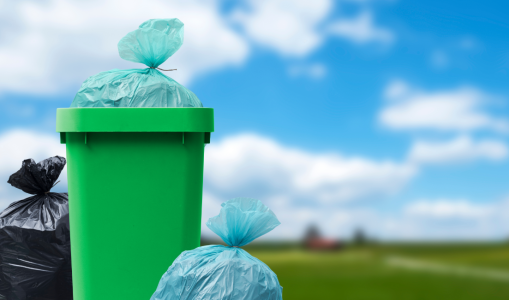Avoid this common green bin error that could undermine your gardening efforts
By
Gian T
- Replies 27
As the leaves turn and the air grows crisp, many spend more time in our gardens, pruning and preparing for the seasons ahead.
But as we trim, weed, and tidy up, it's crucial to remember our role in Australia's waste reduction efforts.
Our green thumbs can contribute to a greener planet, but only if we're mindful of how we dispose of our garden waste.
Addressing a common mistake many residents make when using green waste bins is essential in the spirit of environmental stewardship.
This error hampers our collective mission to reduce landfills and undermines the efforts of local councils and educational bodies, which work tirelessly to guide us towards a more sustainable future.
Halve Waste, an initiative partnering with regional councils, aims to enlighten residents across parts of NSW and Victoria about properly using their red and green waste bins.
Their goal is ambitious yet vital: to reduce waste to landfills by a staggering 80 per cent by 2030, aligning with state government targets.
The green-lidded bin, a familiar sight in many council areas, is designed for organic waste such as food scraps, paper-based products, and general garden refuse.
However, there's a caveat that gardeners in rural communities, including those in the Albury-Wodonga region, must heed.
Particular garden rubbish, particularly invasive weeds, have specific disposal requirements.
While the green bin welcomes all types of weeds, including those classified as weeds of national significance, like the Tree of Heaven, Rhus Tree, and Oleander, there's an exception. Weeds recently treated with herbicides, pesticides, or poisons will not be tossed into the organics bin.
Instead, they belong in the red-lidded general waste bin, as the chemicals they contain can disrupt the composting process and potentially contaminate the resulting compost.
Moreover, large branches, logs, and treated timber are also prohibited from the green bin.
These items can't be broken down like other organic materials and must be disposed of with general waste.
It's a nuanced dance of disposal that can profoundly impact our environment.
Properly sorted garden waste can be transformed into valuable compost, enriching soils and supporting new growth.
Lavender, a common escapee plant, can be composted if it has yet to be chemically treated.
This initiative is just one piece of a larger puzzle as Australia strides towards a more sustainable future.
The Food Organics and Garden Organics (FOGO) bin system is gradually being introduced nationwide.
The aim is to halve the amount of organic waste sent to landfills by 2030.
Innovations, such as devices designed to tackle Australia's coffee waste problem, continue to emerge, and supermarkets like Coles and Woolworths are exploring ways to reduce plastic usage.
Combined with our actions, these efforts paint a hopeful picture of a country deeply committed to environmental conservation.
So, before heading out to your garden, take a moment to familiarise yourself with your local council's green bin policies. By doing so, you're not just tidying up your yard but helping nurture the land we call home.
 Have you encountered any challenges with green waste disposal? Do you have any tips or stories about your gardening practices that help reduce waste? Let us know in the comments below.
Have you encountered any challenges with green waste disposal? Do you have any tips or stories about your gardening practices that help reduce waste? Let us know in the comments below.
But as we trim, weed, and tidy up, it's crucial to remember our role in Australia's waste reduction efforts.
Our green thumbs can contribute to a greener planet, but only if we're mindful of how we dispose of our garden waste.
Addressing a common mistake many residents make when using green waste bins is essential in the spirit of environmental stewardship.
This error hampers our collective mission to reduce landfills and undermines the efforts of local councils and educational bodies, which work tirelessly to guide us towards a more sustainable future.
Halve Waste, an initiative partnering with regional councils, aims to enlighten residents across parts of NSW and Victoria about properly using their red and green waste bins.
Their goal is ambitious yet vital: to reduce waste to landfills by a staggering 80 per cent by 2030, aligning with state government targets.
The green-lidded bin, a familiar sight in many council areas, is designed for organic waste such as food scraps, paper-based products, and general garden refuse.
However, there's a caveat that gardeners in rural communities, including those in the Albury-Wodonga region, must heed.
Particular garden rubbish, particularly invasive weeds, have specific disposal requirements.
While the green bin welcomes all types of weeds, including those classified as weeds of national significance, like the Tree of Heaven, Rhus Tree, and Oleander, there's an exception. Weeds recently treated with herbicides, pesticides, or poisons will not be tossed into the organics bin.
Instead, they belong in the red-lidded general waste bin, as the chemicals they contain can disrupt the composting process and potentially contaminate the resulting compost.
Moreover, large branches, logs, and treated timber are also prohibited from the green bin.
These items can't be broken down like other organic materials and must be disposed of with general waste.
It's a nuanced dance of disposal that can profoundly impact our environment.
Properly sorted garden waste can be transformed into valuable compost, enriching soils and supporting new growth.
Lavender, a common escapee plant, can be composted if it has yet to be chemically treated.
This initiative is just one piece of a larger puzzle as Australia strides towards a more sustainable future.
The Food Organics and Garden Organics (FOGO) bin system is gradually being introduced nationwide.
The aim is to halve the amount of organic waste sent to landfills by 2030.
Innovations, such as devices designed to tackle Australia's coffee waste problem, continue to emerge, and supermarkets like Coles and Woolworths are exploring ways to reduce plastic usage.
Combined with our actions, these efforts paint a hopeful picture of a country deeply committed to environmental conservation.
So, before heading out to your garden, take a moment to familiarise yourself with your local council's green bin policies. By doing so, you're not just tidying up your yard but helping nurture the land we call home.
Key Takeaways
- Residents in parts of NSW and Victoria are being reminded of correct green waste bin usage to reduce landfill as part of a waste reduction initiative by Halve Waste.
- Certain garden rubbish, such as large branches, logs, treated timber, and weeds recently treated with chemicals, should not go in the green-lidded organics bin.
- The initiative aims to minimise landfill waste by 80 per cent by 2030, which aligns with state government targets, including using organic bins for untreated gardens and food waste.
- The article also touches on the broader plans for Australia's sustainable future, including the introduction of Food Organics and Garden Organics (FOGO) bin systems and efforts to reduce plastic in stores like Coles and Woolworths.








